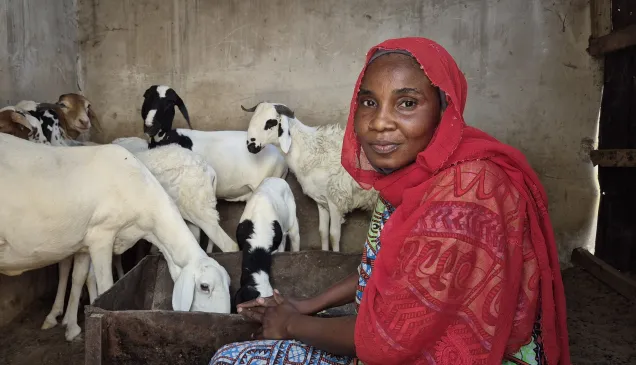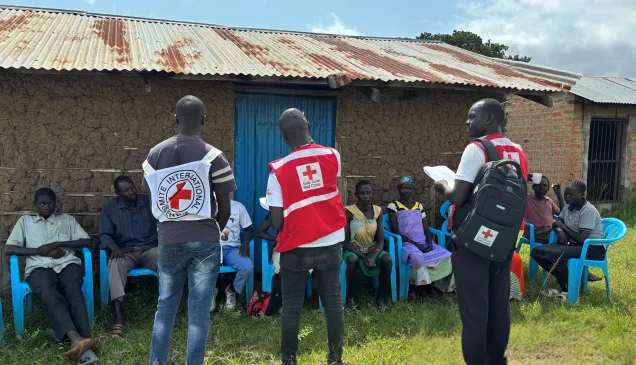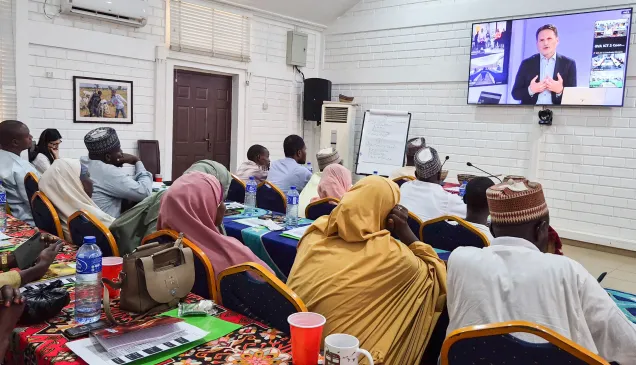Nigeria: Tears of joy as families are reunited with missing relatives
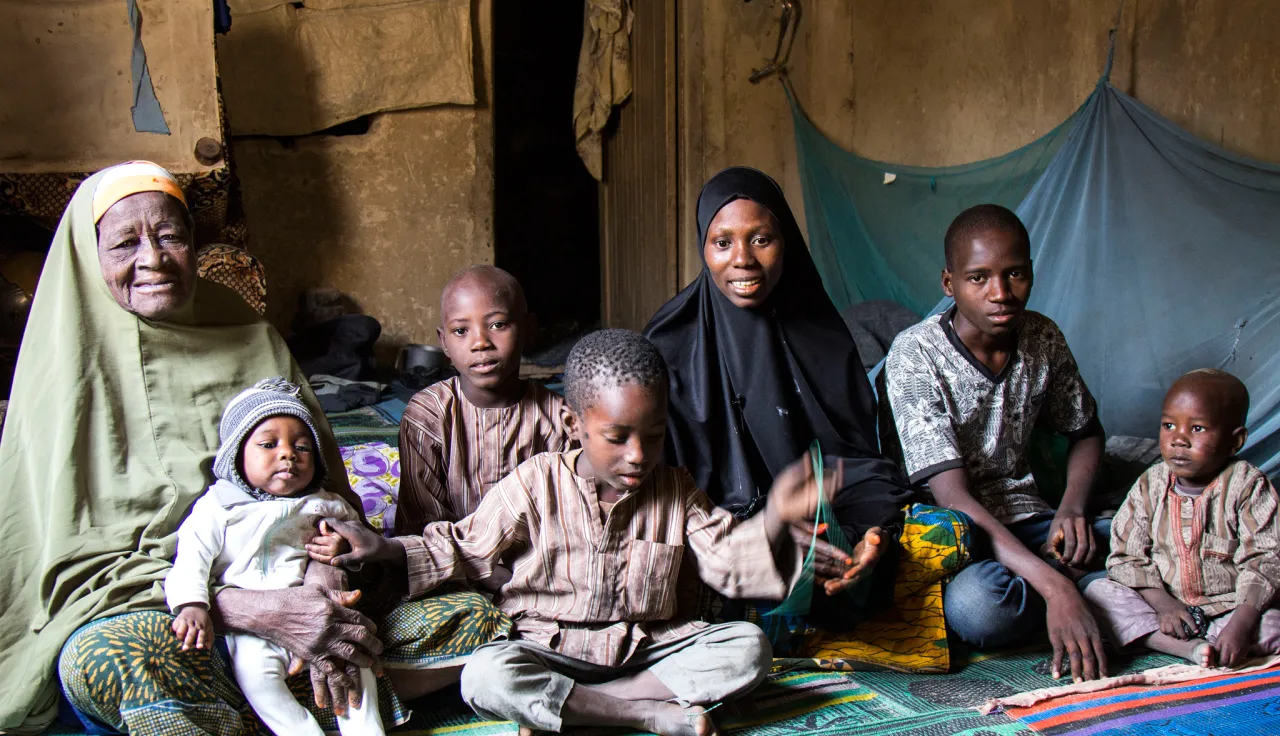
The humanitarian crisis in the Lake Chad region has left thousands dead, two million displaced, hundreds abducted, and hundreds of thousands forced to flee, often losing contact with their families. The ICRC is locating people and putting them back in touch with their missing relatives.
Brothers repatriated from Cameroon
In April 2014, Ahmed and Yussuf Chiroma (12 and 11), were attending school in Cameroon when fighting reached Kumshe, their hometown in north-east Nigeria. Their parents fled, and they have heard nothing from them since.
"We returned to Nigeria in August. Without news from our parents, we couldn't reach our grandmother, Maryam, who lives in Maiduguri," says Yussuf. "When we reached the border, we were taken to a transit camp for displaced persons in Mubi."

Ahmed and Yussuf Chiroma. CC BY-NC-ND / ICRC / Jesus Andres Serrano Redondo.
In Mubi, Ahmed and Yussuf found their older brothers, Bakura and Foke, who had been repatriated from Cameroon. But then the younger brothers were transferred to an IDP camp in Yola, while the older ones were taken to Maiduguri.
A son looks for his mother
Ibrahim Mustapha (17) was also at school in Cameroon.
In mid-August, Ibrahim was repatriated to Nigeria, but on the way he lost his phone containing all his phone numbers, leaving him unable to contact his mother.

Ibrahim Mustapha. CC BY-NC-ND / ICRC / Jesus Andres Serrano Redondo.
"We were taken to Mubi and then to an IDP camp in Yola. I had no money for food or water, and I couldn't call my mother. I thought I would never see my family again," Ibrahim says.
Hafsat Mohammed, from Maiduguri, was in an advanced stage of pregnancy when her son went missing. The stress of not knowing what had happened to Ibrahim caused her to have her baby some weeks before the due date.
"I was really sad, but I kept praying for Ibrahim all those months, hoping that one day he would call me and tell me he was alive and was coming home to meet his new brother," says Hafsat.
A young girl searches for her family
Halima Hauwa (15) spent a year living in the bush with other IDPs after her village was attacked three years ago.
"We had hardly any food, water or shelter for the rainy season. We moved to a village and stayed there for another year, but in January we were attacked again and had to flee to Cameroon," she explains.
Halima sent a message via the Red Cross to her aunt Aisha Baha in Maiduguri. A few days later, she received a picture and a letter from her.
"I couldn't believe they'd found my aunt. But it was even more amazing when they said they were going to take me to her. I was so excited I jumped for joy," recalls Halima, smiling.
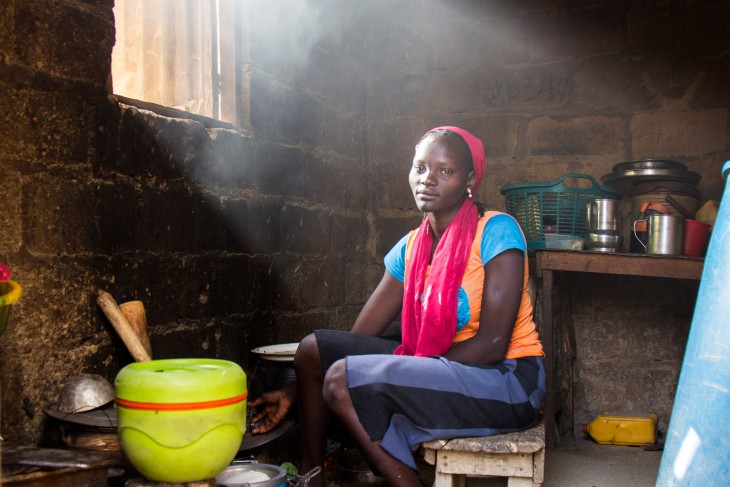
Halima Hauwa. CC BY-NC-ND / ICRC / Jesus Andres Serrano Redondo.
In Maiduguri, Halima's aunt started crying when a Red Cross team brought her a letter from her niece.
"I hadn't heard from Halima for more than three years and we're still looking for her parents. I'd lost all hope of finding her alive," says Aisha.
A flight by ICRC plane reunited Halima with her aunt.
"When we landed and I saw Aisha, I couldn't believe my eyes. I ran to meet her and I couldn't hold back the tears," says Halima.
"I can't say how happy we are to finally have Halima back," Aisha said. "When my husband came home from work and saw her, he just said 'We were waiting for you to have dinner.'"
Restoring contact and hope
A team from the ICRC and the Nigerian Red Cross found the Chiroma brothers and Ibrahim in Yola IDP camp, and the ICRC visited Hafsat in Maiduguri to check that Ibrahim was her son.
"I can't say how relieved I was when I saw Ibrahim's picture," says Hafsat. "He was alive, and after all these months of anxiety, I finally knew where he was."
"When the Red Cross showed me a picture of my mum and my new baby brother, I started feeling at home," Ibrahim recalls.

Ibrahim Mustapha, reunited with his family. CC BY-NC-ND / ICRC / Jesus Andres Serrano Redondo.
Another displaced person in Yola told the Chiroma brothers that he had their grandmother's phone number and that the ICRC could help them find her.
"The ICRC came back to us a few days later with a picture of our grandmother. My brother and I were so happy when we were told to get ready to leave the IDP camp and go home," says Yussuf.
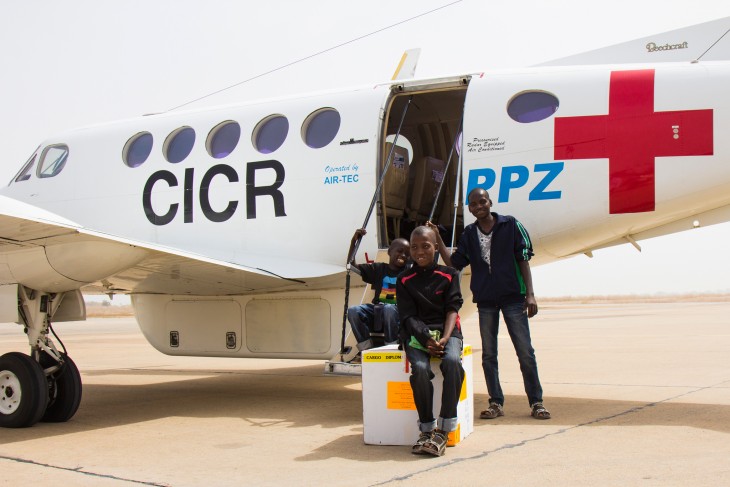
Ahmed and Yussuf Chiroma. CC BY-NC-ND / ICRC / Jesus Andres Serrano Redondo.
"I spent the flight looking at the picture of my grandmother with my brother Ahmed," says Yussuf, a permanent smile on his face.
 x
x
Ahmed and Yussuf Chiroma. CC BY-NC-ND / ICRC / Jesus Andres Serrano Redondo.
As soon as the plane landed, the children rushed to meet their families who had been waiting for them on the tarmac.
"When I saw Ibrahim, I just wanted to carry him on my back like when he was a child. I don't have enough words to thank the Red Cross for helping me find my son," says Hafsat.

Ahmed and Yussuf Chiroma, reunited with their family. CC BY-NC-ND / ICRC / Jesus Andres Serrano Redondo.
For Maryam, the Chiroma brothers' grandmother, finding the boys was nothing short of a miracle.
"I'm still suffering from the lack of news about my son, their father, but now I only have tears of joy because the children are back home," says Maryam.
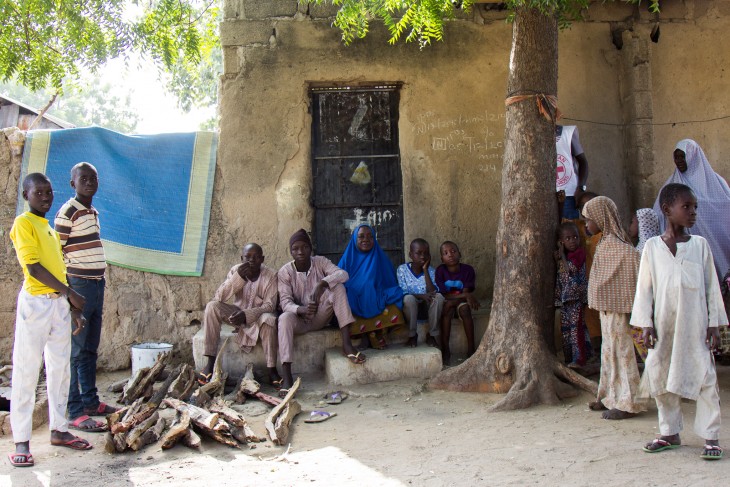
Ahmed and Yussuf Chiroma, surrounded by family and friends. CC BY-NC-ND / ICRC / Jesus Andres Serrano Redondo.
"When I grow up, I want to join the ICRC to help other children to find their families," says Yussuf with his constant smile.
Nigeria's armed conflict has inflicted physical and psychological scars that will be difficult to forget, but Ibrahim, Hafsat, the Chiroma brothers, Maryam, Halima and her family will always carry with them the moment of their reunion. An indelible memory that will mark their lives forever.
Names have been changed to protect the identities of the people concerned.

